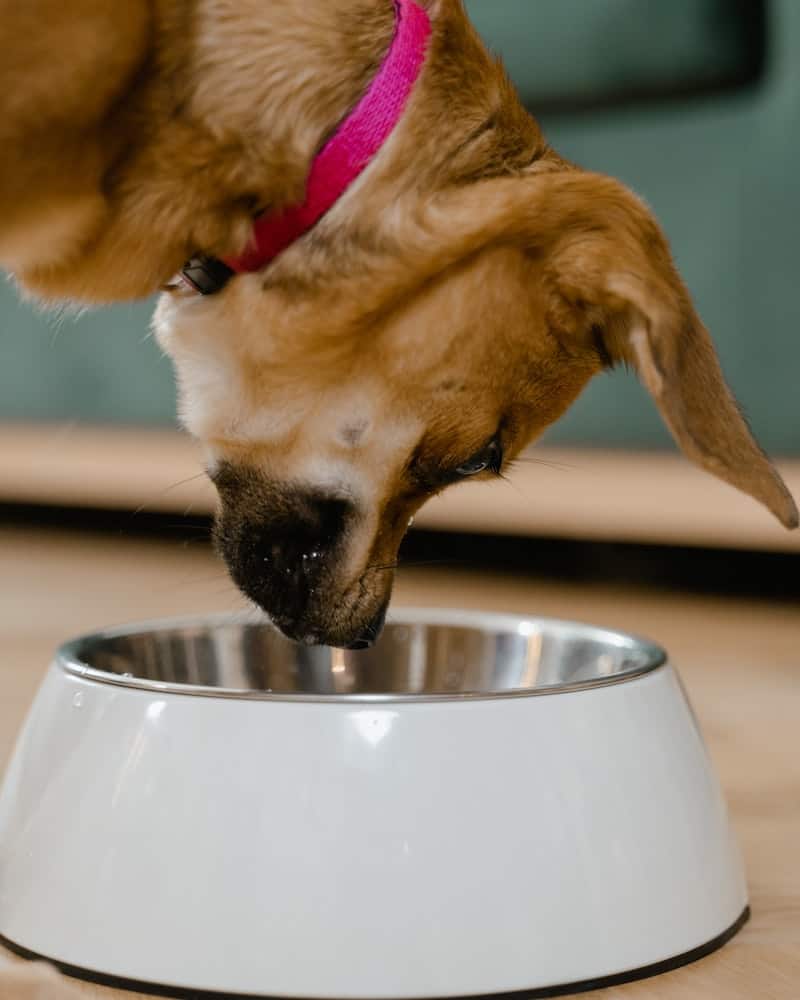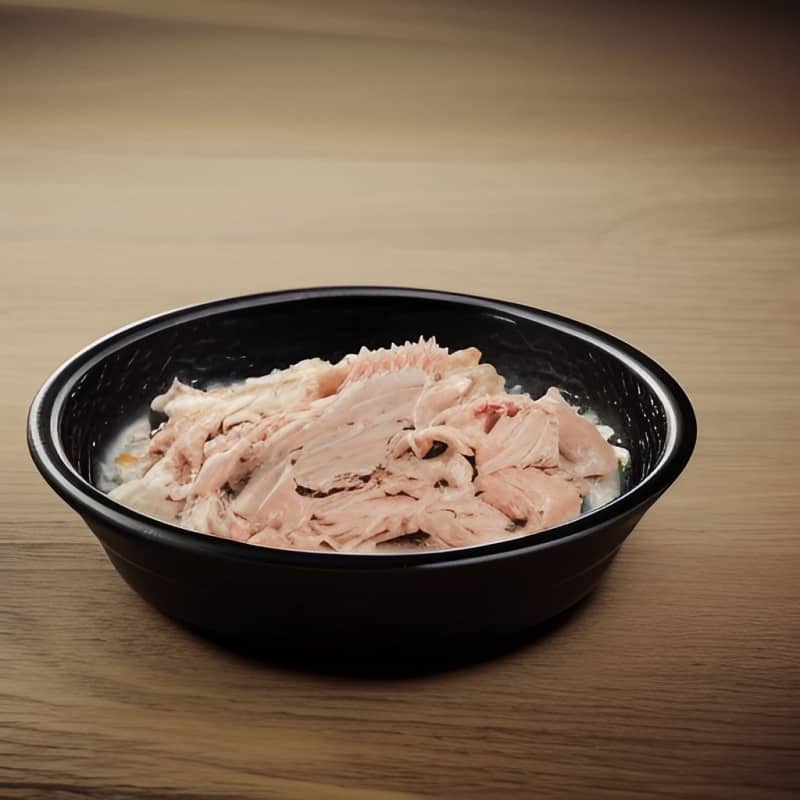Last Updated on October 10, 2023 by ellen
Can dogs eat canned chicken? Is it OK to give your dog canned food? Or will it upset your dog’s digestive system?
Posts may be sponsored. This post contains affiliate links, which means I will make a commission at no extra cost to you should you click through and make a purchase. As an Amazon Associate I earn from qualifying purchases.
Table of Contents
Can Dogs Eat Canned Chicken?
Dog owners may be wondering if it’s ok to substitute canned chicken for some of the dog kibble they feed their dogs. If you’d like to use canned chicken as a dog food topper, keep reading.
So, can dogs eat canned chicken? Keep reading!
Is chicken good for dogs?
Yes, chicken is generally a healthy and nutritious option for dogs. It’s a good source of protein and other essential vitamins and minerals. However, it needs to be cooked properly before feeding it to your dog.
Do not feed them raw chicken. It needs to be cooked properly to kill bacteria. You can give them cooked chicken breast that has not been seasoned. Never give your dog onion or garlic powder.
Can I feed my dog canned chicken breast?
Yes, it is safe to feed your dog canned chicken. Canned chicken is a great source of lean protein and can help keep your dog’s coat healthy. Additionally, if you are trying to avoid grains in your pet’s diet, canned chicken can be an excellent choice as it contains no grain fillers or by-products.
However, when feeding canned chicken, it is important to make sure you are only providing your pet with plain chicken. Any canned food containing seasoning or sauces may contain onions and garlic which can be toxic to dogs.
Can I feed my dog ground chicken?
Yes, ground chicken is a great source of lean protein for your dog. However, you should always make sure the chicken is cooked properly before feeding it to your pup. Ground chicken may contain bacteria such as Salmonella and E.coli which can be dangerous for dogs if not cooked properly.
Can I feed my dog canned chicken straight?
Yes, you can give them canned chicken alone. Or, you can mix canned chicken with wet or dry dog foods.
Can my dog eat canned tuna?
Yes, you can safely feed your dog canned tuna, as long as it is packed in water rather than oil. Tuna is an excellent source of lean protein and omega-3 fatty acids which can help keep your dog’s coat healthy.
However, it should be fed in moderation as too much tuna can lead to mercury poisoning. Always read the label carefully when purchasing canned tuna for your pup.
Is canned chicken a good choice for my dog?
Canned chicken can be an excellent source of lean protein for your dog as long as you stick to plain canned chicken. Choosing high-quality canned food can help you ensure that your pet is getting the nutrition they need.
Additionally, adding canned chicken to your dog’s diet can provide them with extra moisture which can be beneficial for dogs who are prone to developing urinary tract infections or for those on a low-moisture diet.
Overall, while canned chicken is generally safe to feed your dog, it should not be the main source of protein in their diet. It is important to ensure that your pet’s diet contains all the essential nutrients they need for optimal health.
If you are unsure what type of food would be best for your pet, consult with a veterinarian or other qualified pet nutritionist.
How much canned chicken can I give my dog?
The amount of canned chicken you should feed your dog will depend on their age, size, and activity level. As a general rule of thumb, it is best to limit the amount of canned food that you provide to no more than 10-20% of your pet’s total daily caloric intake.
It is also important to consult with a veterinarian or other qualified pet nutritionist to help you determine the best amount of canned chicken for your pet.
Overall, feeding your dog canned chicken can be a great way to add extra moisture and lean protein to their diet. However, it is important to make sure you are providing only plain canned chicken and that you are limiting the amount of canned food in their overall daily caloric intake.
What canned meat can dogs eat?
In addition to canned chicken, there are also a variety of other types of canned meats that can be safely fed to dogs. Canned fish like tuna, salmon, lamb, beef, and turkey are all excellent sources of lean protein.
It is important to make sure you are only feeding your pet plain canned meats with no added sauces or seasonings as these may contain ingredients that can be toxic to dogs. Additionally, make sure you are limiting the amount of canned food in your pet’s daily caloric intake.
Can I add canned chicken to canned dog food?
Yes, you can add canned chicken to canned dog food. Adding canned chicken to your pet’s regular diet is a great way to provide them with additional moisture as well as lean protein.
So, how much canned chicken should you add? Just add a spoonful or two over the top of your regular dog food. We trust this brand.
Can I feed my dog chicken broth?
No, canned chicken is fine to feed your dog. But, canned chicken broth has too much salt. Too much salt is not good for your dog. Skip the excess sodium and give them a healthy treat instead.
You can feed your dog homemade chicken broth as long as you have not added salt or other seasonings like onion powder. They can also have homemade chicken soup with chicken chunks as long as there are no seasonings. A handful of cooked white rice with the canned chicken is fine as well.
Remember, do not feed them canned chicken soup. It has too much sodium. Excessive sodium isn’t good for anyone, including your pet. We trust this brand.
There you have it – now you know all about feeding your dog canned chicken and other types of canned meat. If you are still unsure what type of food would be best for your pet, consult with a veterinarian or other qualified pet nutritionist.
Still curious? Check out: Can dogs have maple syrup.
Related Reading

Ellen runs a small pet sitting business in southern Vermont. She has experience with a variety of small animals, dogs and cats. She has also cared for ducks, chickens and rabbits. Combined, she has over 20 years of experience in pet care and pet sitting.







